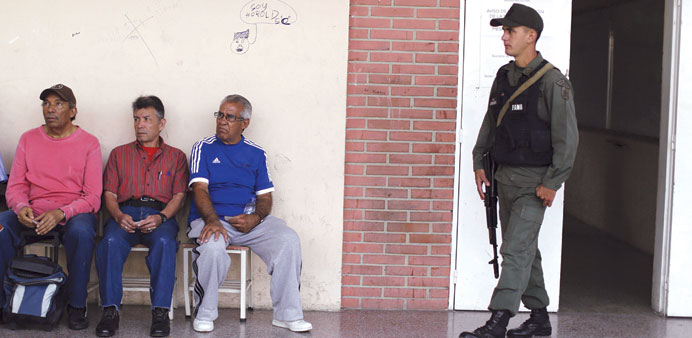People wait to vote at a polling centre in Caracas, yesterday. Venezuela’s ruling socialists held primaries yesterday ahead of December’s parliamentary election they are forecast to lose due to a biting recession and discontent with the late Hugo Chavez’s uncharismatic successor.
Reuters/Caracas
Venezuela’s ruling socialists held primaries yesterday ahead of December’s parliamentary election they are forecast to lose due to a biting recession and discontent with the late Hugo Chavez’s uncharismatic successor.
The South American country is suffering shortages of basic goods ranging from spare parts to milk and medicines, annual inflation possibly in the triple-digits, and unchecked violent crime.
Low-income “Chavistas” who benefit from oil-fueled social programmes now also spend hours in queues for scarce goods and see their salaries gobbled up by roaring inflation.
“The revolution doesn’t work like it used to. You don’t feel that emotion anymore,” said a teacher at a state-run school in a low-income part of Caracas, who is disappointed with President Nicolas Maduro, the former bus driver and union leader she helped elect in 2013.
Still, the 50 year-old woman who asked not to be named, was voting yesterday, in part because she fears for her job if she does not support the government.
The growing ranks of disillusioned ruling party supporters means Venezuela’s MUD opposition coalition has its strongest shot in over a decade at recouping the National Assembly in the December 6 vote.
However, the opposition has struggled to articulate policy proposals, its often wealthy politicians fail to connect with normal Venezuelans and 2014 protests that turned violent tarred its reputation.
The government also boasts a remarkable state propaganda machine, electoral district geography seen as favourable, and, crucially, a hardcore of unflinching loyalists who blame right-wing foes for engineering the economic crisis.
“I’m a die-hard voter,” said Marcos Mirabal, 77, who proudly displays a Chavez figurine in his coconut store in the 23 de Enero hillside slum.
Ruling party candidates include former ministers, Chavez’s brother, an ex-military intelligence head briefly detained in Aruba last year over US accusations of drug-trafficking, and Mister Venezuela 2014.
Around 60% of them are 35 or younger, the government says. The electoral board mandated this week that a minimum of 40% of parliamentary candidates be women.
An outraged opposition, who held primaries last month and is now scrambling to get enough female candidates to meet the new requirement, slammed the move as an illegal last-minute change designed to stave off defeat.
Socialist candidates would only pocket 21.3% of votes for the National Assembly versus the opposition’s 40.1%, a recent survey by pollster Datanalisis showed.
With Maduro’s popularity down at 25.8% according to Datanalisis, some government campaigns appear to be lowering the visibility of the leader who commands nothing of the allure of his mentor Chavez.
Their election song, for instance, features popstar Daniella Cabello, daughter of National Assembly boss Diosdado Cabello, who passionately croons about Chavez and the Socialist Party.
Unlike his predecessor, however, Maduro is not mentioned in the song or featured in the video.

